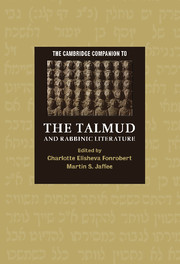Book contents
- Frontmatter
- Introduction: The Talmud, Rabbinic Literature, and Jewish Culture
- Part I: The Conditions of Rabbinic Literary Activity
- Part II: The Genres of Rabbinic Literary Composition
- Part III: Hermeneutical Frames for Interpreting Rabbinic Literature
- 11 The “Other” in Rabbinic Literature
- 12 Regulating the Human Body: Rabbinic Legal Discourse and the Making of Jewish Gender
- 13 Rabbinic Historiography and Representations of the Past
- 14 Rabbinical Ethical Formation and the Formation of Rabbinic Ethical Compilations
- 15 Hellenism in Jewish Babylonia
- Bibliography
- Index
- Source Index
- Series List
15 - Hellenism in Jewish Babylonia
from Part III: - Hermeneutical Frames for Interpreting Rabbinic Literature
Published online by Cambridge University Press: 28 November 2007
- Frontmatter
- Introduction: The Talmud, Rabbinic Literature, and Jewish Culture
- Part I: The Conditions of Rabbinic Literary Activity
- Part II: The Genres of Rabbinic Literary Composition
- Part III: Hermeneutical Frames for Interpreting Rabbinic Literature
- 11 The “Other” in Rabbinic Literature
- 12 Regulating the Human Body: Rabbinic Legal Discourse and the Making of Jewish Gender
- 13 Rabbinic Historiography and Representations of the Past
- 14 Rabbinical Ethical Formation and the Formation of Rabbinic Ethical Compilations
- 15 Hellenism in Jewish Babylonia
- Bibliography
- Index
- Source Index
- Series List
Summary
The great doxographer of the Sophists, Philostratus, relates the following legend about one of his heroes
When this Leon came on an embassy to Athens, the city had long been disturbed by factions and was being governed in defiance of established customs. When he came before the assembly he excited universal laughter, since he was fat and had a prominent paunch, but he was not at all embarrassed by the laughter. “Why,” said he, “do ye laugh, Athenians? Is it because I am so stout and so big? I have a wife at home who is much stouter than I, and when we agree the bed is large enough for us both, but when we quarrel not even the house is large enough.”
Those familiar with the Babylonian Talmud will be reminded of the following anecdote:
When Rabbi Ishmael the son of Yose and Rabbi Elazar the son of Rabbi Shimon used to meet each other, an ox could walk between them [under the arch formed by their bellies] and not touch them.
A certain matron said to them, “Your children are not yours.”
They said, “Theirs [our wives' bellies] are bigger than ours.”
“If that is the case, even more so!”
There are those who say that thus they said to her: “As the man, so is his virility.” And there are those who say that thus did they say to her: “Love compresses the flesh.” (B. Baba Metzia 84a)
- Type
- Chapter
- Information
- The Cambridge Companion to the Talmud and Rabbinic Literature , pp. 336 - 364Publisher: Cambridge University PressPrint publication year: 2007
- 10
- Cited by

